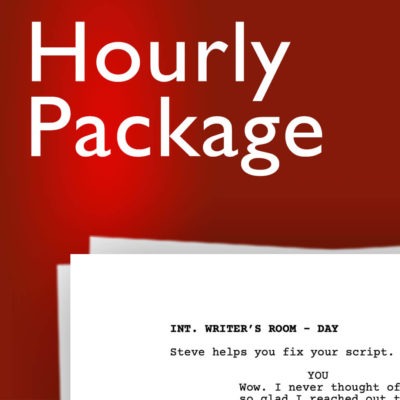by Steve Kaplan
You’re sitting in your living room, watching TV and thinking to yourself,
“That’s not funny. I can do better.”
In fact you know you can do better. In fact, you’ve got this great idea for this great new sitcom! What is an aspiring sitcom writer to do?
Here are the 7 Secrets of Highly Successful Sitcom Writers:
The first step is to write a killer spec. But which one to write? Maybe you never miss an episode of The Middle or Outsourced. You know everything about those shows. So you should write a spec on one of those, right?
Wrong.
Even if an agent or manager does agree to look at your script, chances are he or she doesn’t watch The Middle, never has and never will. So how does he know if your scripts good or not? Well, he doesn’t. And so, it gets tossed.
So write a Two and a Half Men, right? Wrong again.
If the talent rep has been around longer than a couple of months, he’s already read so many Two and a Half Men that his lunch starts to come up if he even sees the name on the front of a script.
SECRET #1: Before you start to write your spec, you need to find out what agents, managers, development and show runners are reading these days. It’s not always the most popular ones. Tastes in sitcoms vary regularly, mostly because of the sheer volume agents and producers have to read. Somthing might be a good read right now, but things will probably be different 3 or 6 months from now.
There are hundreds of message boards online, such as the boards on tvwriter.com, where you can ask questions, share information and generally e-network. (Thank god for the web! What did writers do before Google?)
SECRET #2: Having chosen a show to focus on, the next step is to really zero into it. Watch as many hours of the show as you can, and read some of the produced scripts. If the show isn’t brand new, then the Museum of Broadcasting might be a good place to track one down.
The thing that you’re trying to learn is the show’s voice. You don’t just sit down and start writing jokes. Lines that work on 30 Rock would be out of place on Modern Family. In addition to the tone of the show, you need to become a connoisseur of the voices of the individual characters. You have to understand each character, and how they see the world and how they express themselves. One common complaint about a rejected spec is that “it just didn’t sound like Liz Lemon or Homer.”
OK, you’ve got the show, and you’ve nailed the tone and the characters. That’s it, right? (I bet you already know the answer to that one.)
We’ve often heard of writers beating themselves up at 2AM trying to come up with the best “blow” to the scene (“blow” is term used to describe the final joke or tag to a scene.) But what the writers in the room really spend the most time doing is coming up with the story beats. The beats are the outline for the 22 minute story, often weaving a subplot (the “B” story) in with the main plot (The “A” story).
SECRET #3: The next important step is coming up with a strong story. The best spec stories focus on the series main characters (don’t introduce that kooky uncle from Queens in this one), avoid replicating a plot that’s already been done or that is upcoming in the current season, and has a strong emotional basis. Oh, and is really funny, too.
Many writers make the mistake of thinking that there have to be a certain number of jokes per page—there is no quota. On the other hand, don’t wait until page 8 to introduce the conflict. You have about two or three pages (some agents swear that you only have one) to convince the reader that he or she is reading a strong representative of the real show AND hook them into the main story of the episode AND maybe get a laugh while you’re doing it.
The best way to make sure you’ve accomplished all that? Go find three to seven other writers all doing the same thing.
David Fury (“24, ” “Terra Nova”) was a sketch comedian when he first came to L.A. (his group Brain Trust was among the few sketch groups ever to do the Tonight Show….and this was when Johnny Carson still ruled the roost.) But David wanted more. He wanted to write for television. So he joined a group of writers who got together every week to read each others work and share notes, advice and support. Kind of like A.A., but without all the bad hangovers. With the help of the group, David landed a job on a sitcom. A few years later, Steve Skrovan, a stand-up and cable-show host, also joined the same writers group. Steve had written sketches and plays, but was learning how to write sitcoms. Steve became one of the executive producers of Everybody Loves Raymond.
SECRET #4: The writers group is an indispensable tool for comedy, because comedy doesn’t exist in a vacuum. The best way to find out whether something is funny is to read it out loud in a group of people. If there’s no laughter, you might have a problem. And a writers group is usually an amazing (and free!) resource of story ideas, beat sheets, plot point troubleshooting, gags, job leads and talent rep referrals. Where can you find a group? Again, look online, join a theatre company or take a class. (Groups have often formed out of Comedy Intensive classes I’ve held. In fact, Brain Trust evolved out of a theater I ran in New York, Manhattan Punch Line.)
So now, with the help of your writing buddies, you’ve written the killer script. Now what?
Now you have to get it to someone. That’s great if your Uncle Ari also happens to be the guy running one of the biggest agencies in town, but what if you don’t have an Uncle Ari? Can’t you just send the script out? If it’s great, that’s all you need, right?
The truth about Hollywood is that it’s high school…with money. Remember high school? You didn’t invite the kid with the highest grade average to your parties; you invited the kids you were friends with. (Sometimes they were the same kid, but not always.) Hollywood works the same way. People are just more likely to give your script closer attention if they know the person who handed it to them.
Which means…(SECRET #5)…that you have to sit down and make a list of everyone, and I mean everyone, who you ever knew, or went to school with, or had a cup of coffee with, or stood behind in a line to get a cup of coffee with, and get in touch with that person. Every one of them. Because you have no idea where your big break is coming from or who it’s coming from or who they know or they can pass you along to. And since you have no idea (and you don’t have an Uncle Les Moonves), you need to connect or reconnect with all of them. Invite them out for a cup of coffee. Explain what you’re up to. Ask them to point you in the right direction; what would they do if they were in your situation?
Yes, there are jerks who have forgotten that you loaned them five dollars in the 5th grade, who now won’t return your phone calls (It was Woody Allen who once said that Hollywood isn’t dog eat dog, it’s “dog won’t return the other dog’s phone call”) So what? Who wants to have coffee with a jerk, anyway? The point is, if someone called you out of the blue and asked for help, what would you do? Of course, you’d do what you could for them. So why are you so different from the next person? You’re not. So send those emails, and make those phone calls.
The last step is now that someone who can help has read your script, and you’re sitting with an agent, or manager, or executive producer—now you have to be good in the room! (SECRET #6)
This is that all important quality that separates the men from the baristas – if Hollywood is high school with money, then the writers’ room is summer camp…with even more money. And who wants to spend summer camp with a drudge. That’s why so many ex-comics and actors have made a successful transition to writing: not only are they good writers, they’re great in the room, because they used to entertain much larger rooms of people.
I once recommended a writing team to a literary agent. He liked, not loved, their spec, but agreed to see them as a favor. He called after the meeting and gushed, “They were great!” He wasn’t saying that he just realized how good their writing was, he was excited at how good they were in the room. He was now convinced that if he submitted them to show runners, they would be equally good in those meetings and in the room if they were hired.
Does this mean you have to put on a red nose and show up to meetings with big shoes and a flower in your lapel that squirts water? No, but you do need to know that while being that painfully shy, dark and moody person may have worked for you in your living room while you were writing your laugh-out-loud script, that painfully shy, dark and moody personality is going to be a liability for you in a meeting. Remember how charming you were when you met that significant other? In the room, it’s the same thing. Only with all your clothes on.
So now you know the secrets of successful sitcom spec writing. (Were there seven? I forgot to keep count.) And after a couple of years, some network executive might pull you aside and whisper, “You’re doing a great job! Do you have any ideas for us?” Now, what was that good idea you had? Hmmm……..
Steve Kaplan has taught comedy writing and performing at NYU, Yale University, and UCLA. He currently teaches a comedy writing seminar, the 2-day Comedy Intensive. Events are upcoming in Chicago (November 4-5, 2010), Winnipeg (November 20-22, 2010), Los Angeles (December 4-5, 2010) and New York (March 26-27, 2011). For information, please visit www.KaplanComedy.com.






Been thinking for years, sitcom called wine. Three ladies one guy. Questionably strait. All rehashing there day as how they saw it then showing how it really went. All put in a compressed1.3 hours before there real lives start again.
Steve. This was a great read. Very informative and I’m sure it will be most useful. I’m putting this into effect as we speak! Thanks!
It’s quite sad that in the UK, the quality of sitcom has declined rapidly. No-one is commissioning intelligent quality comedy.
Thanks, I’ve learnt something as a sitcom script writer
Glad it was helpful.
So usefull,thanks alot
Where can I find a group
The old answer was that you’d need to move to LA, NY, Chicago, Toronto, or London to find a group. These days, you only need to fire up your laptop. There are several sites dedicated to bringing writers together, such as Stage32 or The Black List.
good luck!